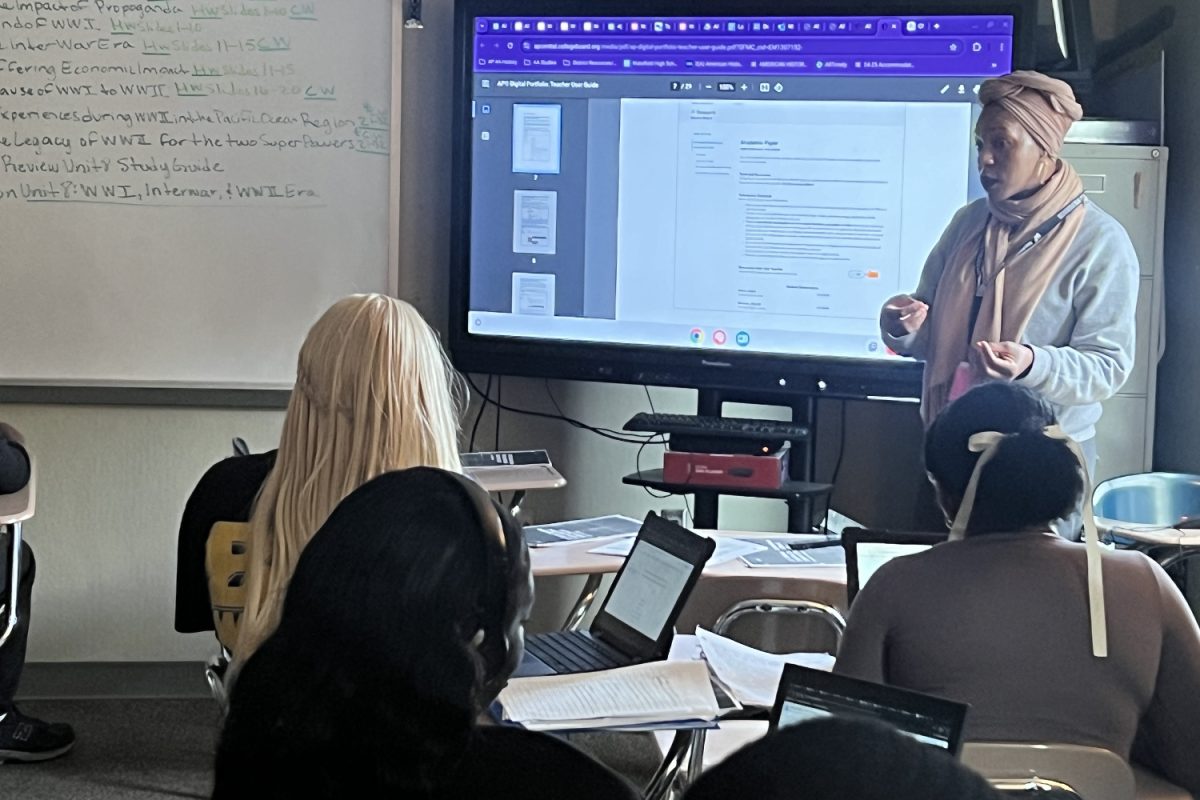On Wednesday, March 13, the U.S. House of Representatives passed a bill by a vote of 352 to 65 that could possibly lead to the banning of the popular social media app, TikTok, in America. The feasibility of this proposal being signed into law is making some users of the platform feel uneasy about the future of their favorite hobby or, in some cases, career.
The case of “banning TikTok” in the U.S. first came to debate due to concerns about data privacy and national security stemming from some Chinese laws that allow their government to secretly collect data on users. The U.S. government is striving to promote security for American citizens by giving China the choice to sell the viral social media app, which is currently owned by the company ByteDance, or have it lose operation in the United States. Wakefield High School’s social studies department chair Lance Atkinson wants to educate the public on the facts behind this bill.
“The law says that it wants the Chinese company to divest the company,” Atkinson said. “It’s not that [the U.S. government is] against TikTok, they’re just against the Chinese ownership of it.”
However, the integrity concerning the basis of this decision has been questioned by passionate users of the video-sharing app. Peter Moran has used TikTok for three years to make comedic content surrounding popular sports news. Since this app has become his livelihood, he is concerned about the House’s true intentions behind banning this app.
“This was motivated by a desire to control information so the U.S. and the corporations that control the government can continue to spread propaganda and limit peer-to-peer information sharing to minimize the power of the people and subdue its constituents,” Moran said.
Ryan Quinlan, another long-time user of the app, is also not fully convinced on the legitimacy of this bill. He elaborates that he wants to trust the U.S. government, but needs further proof to be convinced on the matter.
“I think it is justified so long as there is public and provable evidence that it is negatively shaping U.S. opinion or that the general public’s data that is being collected poses a huge threat to national security,” Quinlan said. “So far, however, I think no evidence has been shown; it currently feels more like a witch hunt with politicians eager to ban something they have the slightest suspicion of [and] that isn’t made in America.”
Though talks of banning TikTok in America has gone on for many years, it had never been a true concern for anyone until news broke. Many Americans brushed off talks of a potential ban on their favorite app as it was hard to believe. Caroline Jones, Cultural Media Literacy teacher at Wakefield and avid user of TikTok, was shocked upon hearing the news of this bill passing.
“It was surprising, just because you never think anything will happen,” Jones said. “Since the law-making and passing process is so tedious, and we’ve been talking about getting rid of TikTok for the past three years, I was surprised that it actually happened. I didn’t know that they could do that in America as we are a free country.”
A large online controversy has stemmed from the House’s decision due to an overarching doubt about the constitutionality of lawmakers. Many have taken to TikTok to explain their long-standing grievances with the U.S. government. However, Atkinson suggests this may be a consequence of differing viewpoints.
“Both [sides] are looking at it from two different perspectives,” Atkinson said. “The public is generally looking at it from a First Amendment rights issue, and the people in Congress are generally looking at it as the Chinese government that owns it is stealing data and using that against Americans.”
Despite this, TikTok users are fearful of the potential implications a full TikTok ban in the U.S. might cause. A significant concern for most TikTok creators is the possibility of losing their jobs. Quinlan understands how much of an impact this ban will have on his life, due to his TikTok earnings being his main source of income.
“If this bill passes I will lose my job,” Quinlan said. “Just a few weeks ago, before the bill became popular, I quit my part-time job when I started being able to make a living on social media. If this happens I will need to quickly enter the job market again to secure a job working for someone else rather than myself.”
These concerns also exist for influencer Chelsea Steelman, who has been using TikTok consistently for nine months. She worries about what the banning of this app means for her as a stay-at-home mom of four kids on one income.
“The passing of this bill would greatly affect my platform and my life,” Steelman said. “The extra money that I have made has gone toward caring for my family. Gaining a [following] on other platforms is considerably harder in my experience.”
However, the public might also stand to benefit from a complete ban of TikTok. Jones recognizes that TikTok takes up a large portion of her life, and is open to the advantages a life away from social media can promote.
“I think it would be for the better of society if there was some sort of control on TikTok,” Jones said. “I think that the consumption of short-form content is not good for our brains; we have no idea how many videos we scroll through even on just a 45-minute scroll, it’s so hard to stop. I think it would [ultimately] be positive if it was banned.”
Though the consequences of a TikTok ban may seem frightening, the bill is still being debated on by lawmakers and has the potential to change. On the other hand, popular trends never last forever.
“I think that all social media has a rise and fall,” Jones said. “We don’t use MySpace anymore, Instagram was on a swift decline… TikTok’s not going to be around forever.”











